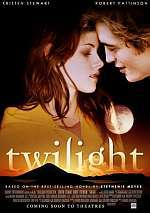Movies
Blood Lust

Twilight begs the question, why do girls always go for vampires? Is it the Byronic good looks? Or perhaps because they’re given to lines like, “You don’t know how long I’ve waited for you,” and “You’re my own personal brand of heroin.” Bella, a junior in high school recently relocated from Arizona to perpetually rain-washed Washington, is susceptible to flattery of the “I will love you eternally, literally” kind.
The story of a smart but outsider girl falling for a brooding, mysterious guy is a tried-and-true formula as old as Jane Eyre and Pride and Prejudice. When Edward—the brooding, mysterious vampire—disses Bella in biology class, he might as well be Mr. Darcy snubbing Elizabeth at the country dance.
Even though Twilight is chock-full of cliches and bizarre leaps of logic (why exactly is a 117-year old vampire enrolled in high school, anyway? Calculus still giving him trouble?), it’s like a pop song: recycled melody, skin-deep lyrics, but catchy in a guilt-inducing way. Many viewers have already observed that the idea of an eternally 17-year old vampire struggling to deny the impulse to bite into his girlfriend’s tempting neck is a metaphor for teen sex (much as Francis Ford Coppola’s early-90’s Dracula was seen to comment on the AIDS epidemic). That Edward resists out of love for Bella is encouraging, but Bella acts like a more-than willing victim: “I’d rather die than to stay away from you.” Not the kind of thing a parent would care to overhear from outside a closed bedroom door.
It’s not surprising, however, since Twilight is more Anne Rice-lite than Nosferatu. No crucifixes or holy water in sight. Edward is a misunderstood vampire, a “vegetarian” who only feeds on forest animals (PETA might object to his definition of a vegetarian) and feels tormented by his desire for human blood. The vampire myth has been told and retold as the epic battle between good and evil, between darkness and light. Here, we have the vampire story as teen romance/melodrama. That the Twilight vampire is like a Romantic poet, all soulful smoldering, conveniently forgets the fact that Shelley left a trail of dead women behind him.
By AT 12.19.08 12:57AM Not Rated
Those are really good points, Anna, and well expressed. One of the things about the movie I liked (and I’m assuming this comes from the book), is how it pays homage to great literature of the past, from ‘Jane Eyre’ (Edward is very Mr. Rochester) to ‘Pride and Prejudice,’ as in the ‘snubbing’ scene I referenced in the review. I could easily imagine the ‘Twilight’ series leading young readers to books by the Bronte sisters or Jane Austen. It’s part of a long and venerable tradition of brooding hero and intelligent, outsider heroine.








By Anna AT 12.18.08 11:28PM Not Rated
Although I agree when you note that it seems Bella could more deeply appreciate Edward’s resolution to deny himself for her, I think it’s important to stress how much Twilight’s female adolescent fans seem to appreciate it. It’s not wildly popular because it’s a vampire movie; it’s wildly popular because the emphasis on self-sacrifice has restored an element of true romance to what would otherwise be a highly forgettable, trite story, and it does so in a desert of entertainment options for young girls. I remember being a Titanic-obsessed fifteen-year-old not because the romantic couple had premarital sex, but because he died for her (although my pride won’t allow me to say anything good about Titanic without also disclaiming any enduring attachment to it, or conviction of its ultimate value.) While it leaves much to be desired as a really good book or really good film, I’m convinced that what makes it more popular than others things in its genre is something that is just that: really good. You call it a “vampire story as teen romance/melodrama.” But perhaps it’s more accurate to think of it the other way around. In a cultural context of amorality, the realm of the imagination often seems to offer the only sneak-in door for concepts like chastity. This point is well-expressed, if not entirely intentionally, by an article published in The Atlantic:
If a novel of today were to sound these chords so explicitly but in a nonsupernatural context, it would be seen (rightly) as a book about “abstinence,” and it would be handed out with the tracts and bumper stickers at the kind of evangelical churches that advocate the practice as a reasonable solution to the age-old problem of horny young people… In the course of the four books, Bella will be repeatedly tempted—to have sex outside of marriage, to have an abortion as a young married woman, to abandon the responsibilities of a good and faithful mother—and each time, she makes the “right” decision. The series does not deploy these themes didactically or even moralistically…What is interesting is how deeply fascinated young girls, some of them extremely bright and ambitious, are by the questions the book poses, and by the solutions their heroine chooses.
(http://www.theatlantic.com/doc/print/200812/twilight-vampires)